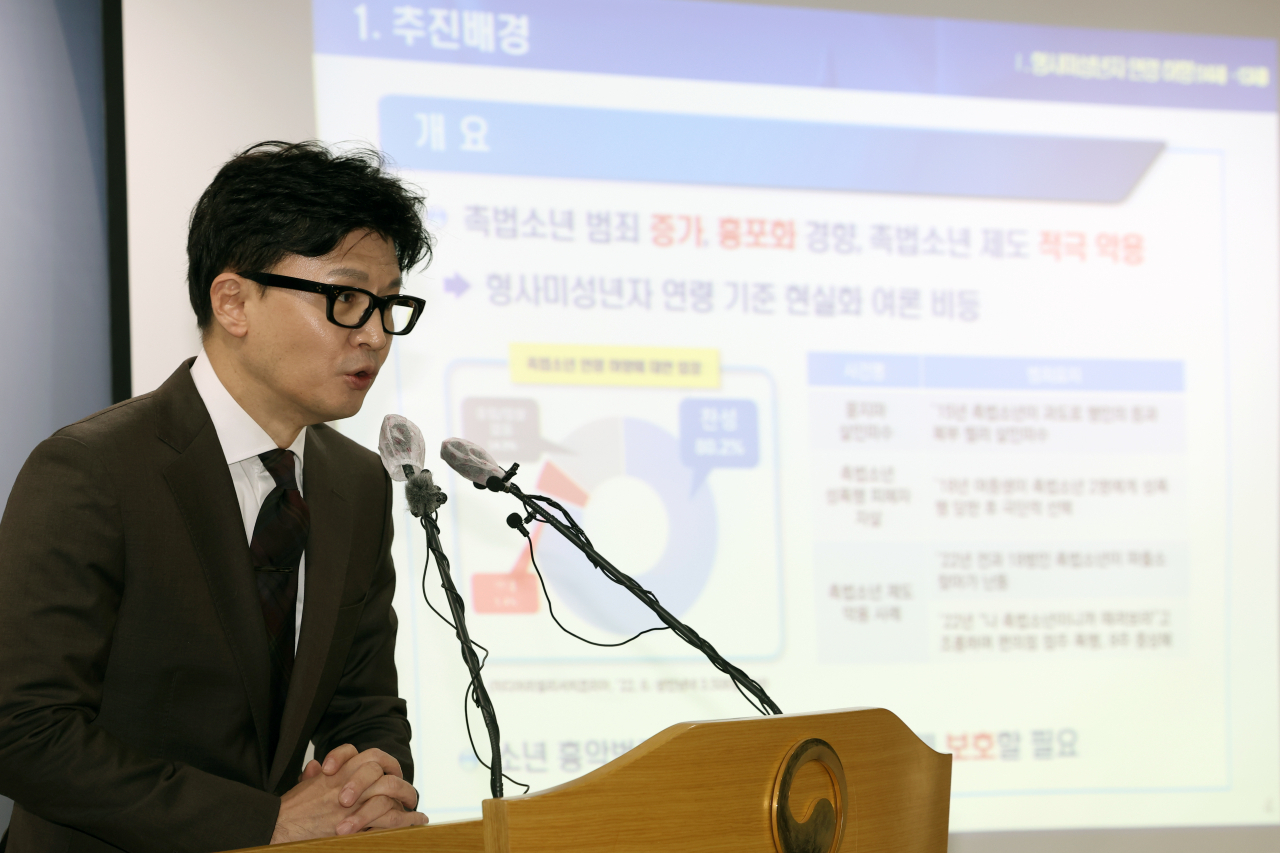 |
Justice Minister Han Dong-hoon speaks at the press conference held at Justice Ministry in Gwacheon, south of Seoul, Wednesday. (Yonhap) |
The Ministry of Justice announced comprehensive countermeasure plans to deal with young offenders, including lowering the maximum criminal minor age from 14 to 13, Wednesday.
Justice Minister Han Dong-hoon said at a press conference at the Justice Ministry on Wednesday that the aim was not rigid adherence to discipline or lowering the age standard in itself.
"It is for the reformation of juvenile offenders and protection for victims," he said.
At present, offenders aged over 10 and under 14 -- referred to as criminal minors -- are tried only under the Juvenile Act. Focusing mainly on reformation, the heaviest sentence under the Juvenile Act is two years in a juvenile detention center regardless of the crime. Minors over the age of 14 can be tried under the Criminal Act depending on the gravity of the crime.
However, calls for lowering the criminal minor age have risen with the increasingly violent and frequent nature of juvenile crimes. A change to the age limits would require legislation in the National Assembly.
President Yoon Suk-yeol had pledged to lower the age standard of criminal minors by two years, from 14 to 12, during his presidential campaign, and the Justice Ministry launched a task force on the issue in June.
Although the plan announced Wednesday falls short of Yoon's pledge, it is seen as a compromise considering the shortage of adolescent prison and detention facilities.
Han presented several factors supporting the plan to lower the criminal minor age standard to 13 -- the standard that has been fixed for nearly 70 years since the enactment of the Criminal Act in 1953. About 70 percent of juvenile offenders punished under the Juvenile Act in last five years were 13, and 13 is the age distinguishing elementary and middle school in Korea.
Measures to prevent recidivism were also included in the plan, considering criticism that lowering the age standard alone would not help prevent actual juvenile crimes.
Facilities and infrastructure for juvenile offenders will be expanded, such as arranging four-bed rooms instead of dormitories that accommodate over 10 young offenders. Basic education to aid young offenders’ return to society will be encouraged, as well as measures to protect victims, such as providing legal grounds for restraining orders. A program of scientific study to prevent juvenile crime and recidivism is also planned.
Also, considering possible disadvantages that young offenders might confront after returning to society, the ministry will review restricting the inquiry of crime record that the convict had committed at 13.
Regarding concerns that lowering the age standard of criminal minors could increase juvenile offenders’ contact with adult criminals, the Justice Ministry task force explained that the majority of juvenile offenders will be sent to juvenile detention centers as before and criminal punishment will be applied only in very exceptional cases of serious felons, such as premeditated murder.
Meanwhile, on the same day the human rights watchdog expressed concerns. “Lowering the criminal minor’s age standard might expand the negative perspective toward juvenile offenders, impeding their return to society and reformation. It cannot be a practical resolution to deal with the fundamental causes of juvenile crime.”







![[Today’s K-pop] Blackpink’s Jennie, Lisa invited to Coachella as solo acts](http://res.heraldm.com/phpwas/restmb_idxmake.php?idx=644&simg=/content/image/2024/11/21/20241121050099_0.jpg)